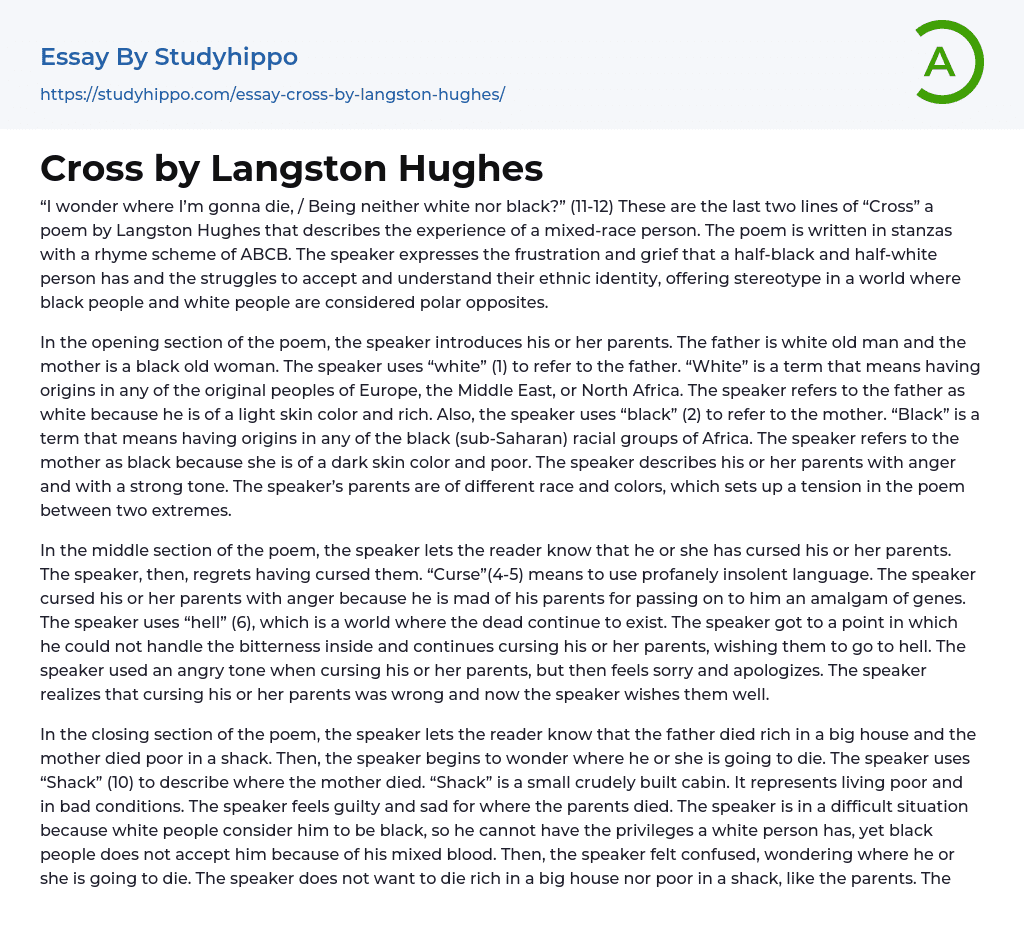“I wonder where I’m gonna die, / Being neither white nor black?” (11-12) These are the last two lines of “Cross” a poem by Langston Hughes that describes the experience of a mixed-race person. The poem is written in stanzas with a rhyme scheme of ABCB. The speaker expresses the frustration and grief that a half-black and half-white person has and the struggles to accept and understand their ethnic identity, offering stereotype in a world where black people and white people are considered polar opposites.
In the opening section of the poem, the speaker introduces his or her parents. The father is white old man and the mother is a black old woman. The speaker uses “white” (1) to refer to the father. “White” is a term tha
...t means having origins in any of the original peoples of Europe, the Middle East, or North Africa. The speaker refers to the father as white because he is of a light skin color and rich. Also, the speaker uses “black” (2) to refer to the mother. “Black” is a term that means having origins in any of the black (sub-Saharan) racial groups of Africa. The speaker refers to the mother as black because she is of a dark skin color and poor. The speaker describes his or her parents with anger and with a strong tone. The speaker’s parents are of different race and colors, which sets up a tension in the poem between two extremes.
In the middle section of the poem, the speaker lets the reader know that he or she has cursed his or her parents. The speaker, then, regrets
having cursed them. “Curse”(4-5) means to use profanely insolent language. The speaker cursed his or her parents with anger because he is mad of his parents for passing on to him an amalgam of genes. The speaker uses “hell” (6), which is a world where the dead continue to exist. The speaker got to a point in which he could not handle the bitterness inside and continues cursing his or her parents, wishing them to go to hell. The speaker used an angry tone when cursing his or her parents, but then feels sorry and apologizes. The speaker realizes that cursing his or her parents was wrong and now the speaker wishes them well.
In the closing section of the poem, the speaker lets the reader know that the father died rich in a big house and the mother died poor in a shack. Then, the speaker begins to wonder where he or she is going to die. The speaker uses “Shack” (10) to describe where the mother died. “Shack” is a small crudely built cabin. It represents living poor and in bad conditions. The speaker feels guilty and sad for where the parents died. The speaker is in a difficult situation because white people consider him to be black, so he cannot have the privileges a white person has, yet black people does not accept him because of his mixed blood. Then, the speaker felt confused, wondering where he or she is going to die. The speaker does not want to die rich in a big house nor poor in a shack, like the parents. The speaker have the rest of his or
her life to figure out if to choose being white or to embrace being black.
With his poem Langston Hughes stated that: half-black and half-white people struggles to accept and understand their ethnic identity in a world where black people and white people are considered polar opposites. The poem is well written. It is about the struggles of being of a mixed race and how a person wants to be “normal.” The speaker is angry because his or her life was difficult because he or she could not integrate in society. Everyone would talk about him or her in a bad way. The speaker wanted to show that being of a mixed race is a major problem that faces society. I chose this poem because I liked how the author describes the racism that society had during that time because of the segregation of whites and blacks. The quote “I wonder where I’m gonna die, / Being neither white nor black?” (11-12) can make the reader feel bad for the speaker, but the real question should be: “Where are those people who criticized him or her going to go when they die?”
- Feminism essays
- Animal Rights essays
- Animal Testing essays
- Bullying essays
- Abortion essays
- Abuse essays
- Immigration essays
- Poverty essays
- Human Rights essays
- Inequality essays
- Violence essays
- Torture essays
- Crash essays
- Assault essays
- Racism essays
- Prejudice essays
- Controversial Issue essays
- Cyber Bullying essays
- Women's Suffrage essays
- Women'S Rights essays
- Women Empowerment essays
- Sojourner Truth essays
- Bullying In Schools essays
- Pro Choice essays
- Pro Life essays
- Should Abortion Be Legal essays
- Against abortion essays
- Abortion Debate essays
- Abuse Support essays
- Child Abuse essays
- Alcohol Abuse essays
- Physical Abuse essays
- Sexual Abuse essays
- Substance Abuse essays
- Migration essays
- Human Migration essays
- Illegal Immigration essays
- Immigrants essays
- Refugee essays
- Overpopulation essays
- Homelessness essays
- Hunger essays
- Dumpster Diving essays
- Homelessness In America essays
- Euthanasia essays
- Assisted Suicide essays
- Censorship essays
- Gun Control essays
- Empowerment essays
- Civil Rights essays




